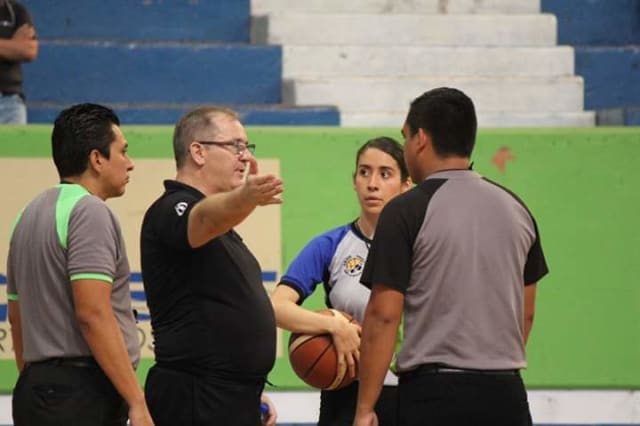Honduras' new golden generation of FIBA referees
TEGUCIGALPA (Honduras) – The National Basketball Federation of Honduras (FENABAH), in compliance with the new processes and rules established by FIBA for the Games Officials Licensing 2019-2021, has taken
TEGUCIGALPA (Honduras) – The National Basketball Federation of Honduras (FENABAH), in compliance with the new processes and rules established by FIBA for the Games Officials Licensing 2019-2021, has taken two important steps toward strengthening the new generation of FIBA referees in Honduras.
FENABAH began to renovate the license of the only Honduran international referee Orlando Varela, thanks to the opening granted by FIBA according to the national team rankings, which directly affects the number of international referees. During the process, FIBA shared with Honduras the possibility of applying for a second referee candidacy and appointed Mikaela Ferrari Rodríguez as a possible candidate to take on the challenges posed by the process.
“FIBA decided on March 19 to approve our request and, to our country’s satisfaction, on August 12 we received an official communication announcing that Orlando Varela’s international referee license was renovated and that, Mikaela Rodríguez is, from this moment on, the first female FIBA referee from Honduras. This is a historical feat for our nation and our basketball,” said to FIBA.basketball Carmen Cubas, who oversees the FIBA OL2019 process for FENABAH.
“I'm the first female FIBA referee in my country and this achievement has been a great pride for me and for the people that created the conditions and the means for this, such as Raúl Alas, Orlando Varela, and Carmen Cubas, the image of our Federation. This process and experience have also been demanding, motivating and gratifying. I'm excited for what lies ahead in my future. I'm preparing both mentally and physically to bring glory to not only my country but to myself and the people that support me and that guide day by day in this career,” stated Ferrari to FIBA.basketball.
Orlando Varela is 27 years old and has a FIBA black category referee license since 2012. He's also a college professor, a clinical and sports psychologist, and an athlete. He's experienced in potential referee camps in the Americas. Recently, as a professor, he was invited to offer an international conference regarding “Psychological tools applied to clinical nutrition,” at the Jesuit University in Guadalajara, Mexico.
“The experience with the licensing processes has been a challenge. It entails a lot of personal work, constant updating, responsibility, and committing to your own body and mind to reach an optimal physical condition. Each new lesson has personal repercussion and affects our surroundings. As my refereeing improves, this benefits the work that contributes to my country. Constancy brings important results, and that's what it's all about,” said Varela to FIBA.basketball.
“We're very happy to have the first female international referee from Honduras. She’s a colleague and a friend. We've been working toward this objective for many years and she was in the necessary level and had the needed commitment for this opportunity. She’s taking on the responsibility of setting an example and being a model for Honduras' female refereeing,” Varela added.
26-year-old Mikaela Ferrari has a FIBA white certification and she’s also an independent architect specialized in construction and urban planning. With her husband Saúl Antonio Rodríguez, and their ten-month-old baby Helenita (also known as Little explorer), she has a project titled “Hondufalls”, where the family visits waterfalls in Honduras to catalog them for tours and tourist guides in their country.
Ferrari recently participated in the Referee Training Camp with the support of the FESABAL, and under the direction of FIBA Americas Referees Director, Geraldo Fontana.

“The FIBA camp met all my expectations of what is needed to become an international referee, the profile FIBA requires, and what happens behind each game. I'm content with the observations, the advice, the congratulations and the guidelines of Geraldo Fontana,” said Mikaela Ferrari.
FIBA referee and candidate profiles now have new requisites, ages, language proficiency levels, height, build, potential and capabilities. There are new high-standard processes in place to obtain international referee licenses.
“It's an immense joy having reached the goal as a national instructor and director to have the first woman basketball referee in Honduras obtain her international license. It was hard work to find a candidate with the values and discipline because if you want to be a FIBA referee you need to have all the technical, theoretical and practical knowledge, as well as the mindset to achieve the goal. Mikaela did it, she passed the tests FIBA requires,” assured Raúl Alas, Honduras National Referee director.
“As President of the Referees Association, we’ll continue with Orlando Varela to work with the people that have that mindset of reaching the goal of becoming international referees, who have the passion (and are willing to make) sacrifices,” he added.
The Federation assumes the responsibility of working to open new spaces for the youth, for committed Hondurans that want to achieve their dreams in the sport and whose talents, capabilities, perseverance, and achievements make them stand out. They also motivate more generations to break stereotypes, overcome their fears, and strengthen – above all – female roles in the sport. Each girl, friend, mother, sister athlete should feel safe and respected in order to make Honduras’ – and the world’s – female basketball grow,” stressed Cubas.
She then concluded: “We expect to receive the official designations very soon, and that Mikaela and Orlando have their first international event together. We are aware of their commitment to represent Honduras, our National Federation, and all basketball referees in our nation.”
FENABAH will continue moving forward to a new international age of refereeing by the hand of two young and competent FIBA referees who represent a golden generation – one that has overcome obstacles and is set on building a new history for this Central American country's refereeing.
FIBA